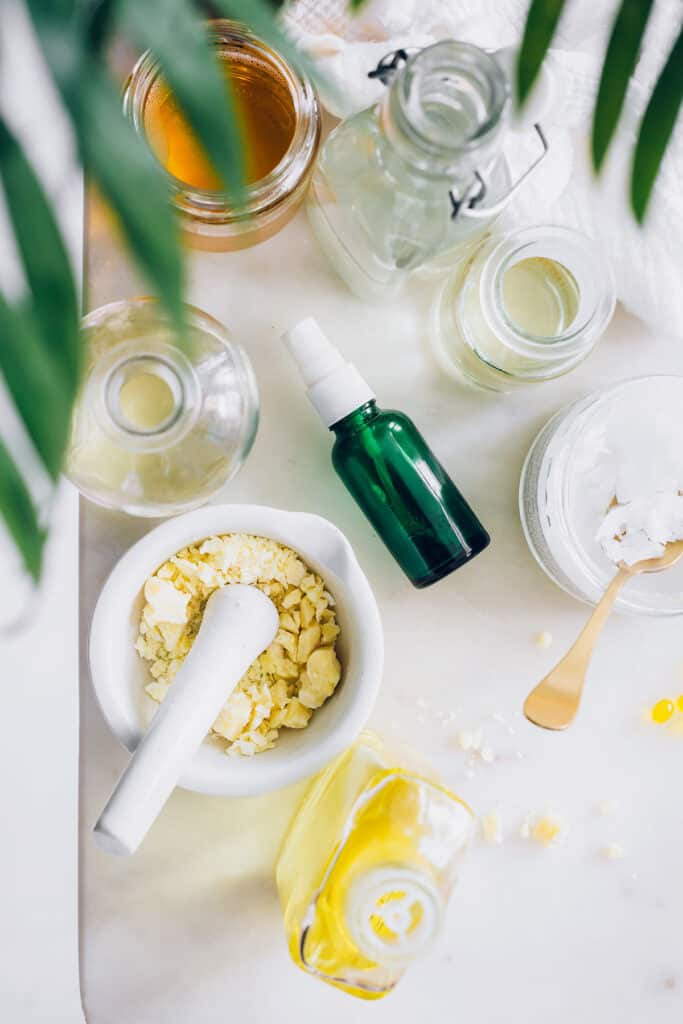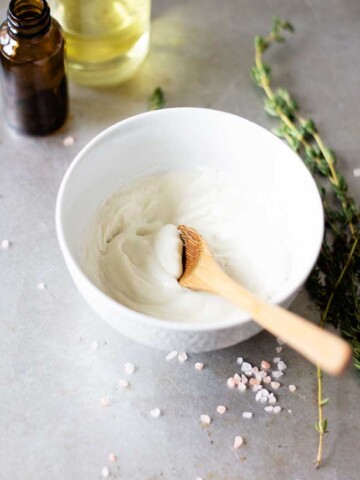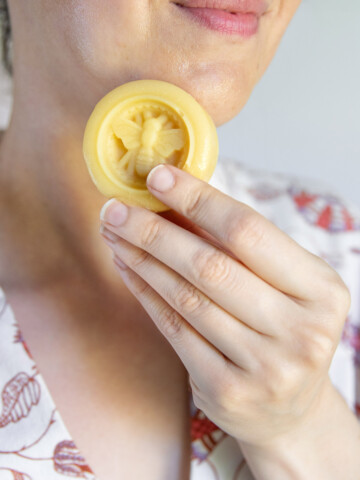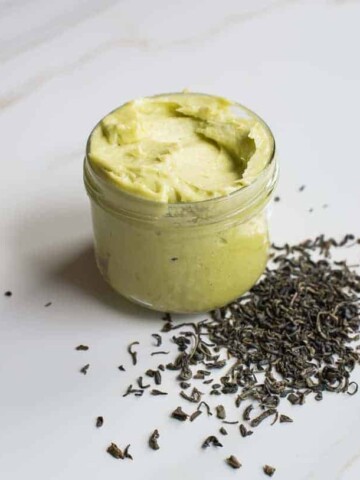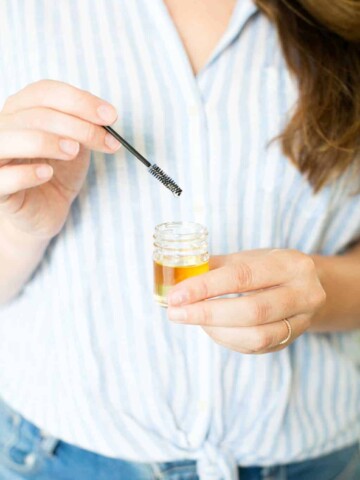The search for a natural face moisturizer may not be as arduous as you might think. In fact, for some of them, it might not take you farther than your own kitchen! There are plenty of ingredients in the kitchen that can do double duty as a natural face moisturizer.
Don’t assume that just because a moisturizer is expensive, it has to be good for your skin. I’ve tried one too many creams that left my face as dry as before (or, even worse, caused my skin to break out). And then, I discovered homemade natural face moisturizers.
Oh, the luxury of having something custom-made just for yourself! Scroll down, and you will find some of our favorite ingredients and recipes, perfect for cold days when your skin is suffering.
10 Natural Face Moisturizers
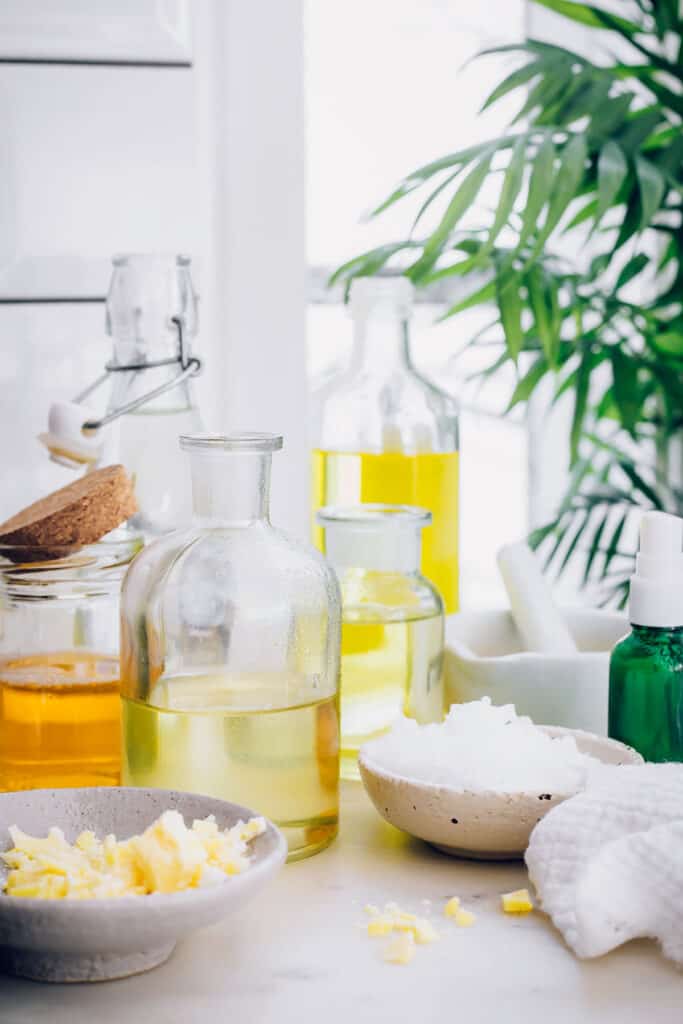
1. Coconut oil
While coconut oil serves countless purposes in the kitchen and for your face, it won’t necessarily serve all every type of skin. However, if you have dry, dehydrated skin, you are a great candidate for coconut oil.
Coconut oil protects skin from UV radiation [source]. Its high fatty acid content and potent antioxidant and anti-inflammatory properties [source] help with the skin’s natural barrier but could cause breakouts if you have oily or acne-prone skin.
Coconut oil is soothing and naturally antibacterial [source], but it may clog pores. So if you’re prone to blackheads or acne, beware of coconut oil.
2. Cod liver oil
This is one ingredient that could produce double the benefits if you take it orally and use it externally. Cod liver oil is rich in omega-3 fatty acids and vitamins A and D. Linoleic acid is one of the most prominent fatty acids in fish oil and is a precursor to ceramide, which makes up part of the skin barrier. Fish oil fatty acids hydrate the skin, improve texture and elasticity, and act as photoprotectants that counteract the effects of skin aging [source].
3. Sweet almond oil
Ideal for almost all skin types, almond oil helps soothe irritated skin and is rich in vitamins D and E. It can minimize scarring [source] and protect the skin from UV damage.
Replenish your skin with this rejuvenating rosehip and almond oil moisturizer. It’s light and smooth, perfect for sensitive skin on the face and neck, but still hydrating enough for more serious areas like the legs, hands, and elbows, which makes it a great multitasking product.
4. Shea butter
Shea butter is another great choice for all skin types as it isn’t clogging but is rich in vitamins and minerals. It’s easily absorbed into the skin and promotes cell regeneration. This tree nut extract is both hydrating and antibacterial.
Shea butter is a natural moisturizer that has been used for centuries in West Africa. Extracted from the nuts of the shea tree, shea butter is a rich source of vitamins A and E, as well as essential fatty acids. When applied to the skin, shea butter helps to lock in moisture, making it an excellent choice for dry, itchy or flaky skin.
One of the unique properties of shea butter is its ability to penetrate deep into the skin, providing long-lasting moisture. This is due to its high concentration of fatty acids, which create a barrier on the skin that helps to retain moisture. Regular use of shea butter can help to improve the texture and elasticity of the skin, leaving it soft, smooth and supple.
Especially helpful during cold, dry months, when you need a deeply hydrating moisturizer, this shea butter face cream does wonders on dry and aging skin. Apricot kernel [source], jojoba [source], and argan [source] oils are added to the mix to ward off sagging, wrinkles, and fine lines.
5. Olive oil
While olive oil may not be ideal for sensitive skin types or those who may be prone to clogged pores, it has proven to be the perfect moisturizer for some. The antioxidants contained in olive oil help fight premature aging, and it’s high in vitamins A, D, E, and K.
However, it has been shown in some studies to interfere with the integrity of the skin barrier [source], so those with sensitive skin should avoid it.
6. Grape seed oil
Grape seed oil is loaded with vitamin E, even more than olive oil, and its high level of antioxidant activity is one of the benefits. It has toxic effects on one of the most common skin bacteria, Staphylococcus aureus [source], and has been shown to expedite wound healing [source].
When purchasing it, make sure to find the cold-pressed version, which will have retained many of the oil’s natural, healthful constituents. Additionally, there will be no residues from the solvents used in other extraction techniques, making it a safer choice [source] for natural face masks and moisturizers.
7. Aloe vera gel
Highly anti-inflammatory and great for soothing sunburns and minor cuts, aloe vera gel is not just for drinking. Aloe vera is a moisturizer that can be used for acne-prone, sensitive, and dry skin. Aloe kills the bacteria that causes acne, lightens the appearance of age spots and blemishes, and it plumps up and softens skin to hide wrinkles [source].
Pair the aloe vera with a carrier oil that works for your skin type, and add a few drops of nourishing skin essential oils for a healing and hydrating homemade face serum that’s perfect for daytime.
8. Avocado oil
A powerhouse moisturizer, avocado oil can treat all skin types. The oil is hydrating without leaving an oily residue.
It is full of omega-3s that balance skin’s moisture levels and vitamins A, D, and E, known to rejuvenate dry skin and fight free radicals [source]. It has been shown in animal studies to increase collagen production [source]. It's is also anti-inflammatory and has been known to benefit those who battle eczema and psoriasis.
Try rich avocado oil in an anti-wrinkle eye serum. If you don’t have any on handl, you can also use the fruit itself and slather on an avocado face mask.
9. Sunflower oil
This noncomedogenic oil is easily absorbed into the skin. Sunflower seed oil contains both vitamin E and beta-carotene, and it can be used on all most types of skin.
A great oil for normal skin, sunflower seed oil makes a simple custom face oil that offers hydration and balances oil production. It has been shown to improve skin barrier function [source] and help the skin retain its own natural moisture [source].
10. Honey
Honey is a natural humectant that draws in moisture [source]. Use it to wash your face, or make a homemade honey mask to leave your face dewy and glowing.
If you're looking for a natural way to moisturize your skin, there are several great options to consider. Coconut oil is a great moisturizer, as it can help lock in moisture and improve skin texture. Avocado oil, olive oil, and almond oil are also recommended for their moisturizing benefits. Consider adding vitamin E or hyaluronic acid to your routine. Essential oils such as tea tree oil can also be used, but make sure to use them sparingly and dilute them properly. Overall, natural moisturizers can be an effective way to nourish and protect your skin, while avoiding harsh chemicals and additives.
Are you already combing through your pantry and checking to see which facial moisturizers are hiding in your kitchen? Remember, for these ingredients, the higher the quality, the better the results. And always patch test if you are prone to allergies or skin sensitivities.
This post was medically reviewed by Dr. Jennifer Haley, a board-certified dermatologist with extensive experience in medical, cosmetic, and surgical dermatology. Learn more about Hello Glow’s medical reviewers here. As always, this is not personal medical advice, and we recommend that you talk with your doctor.
Photos by Ana Stanciu
547
